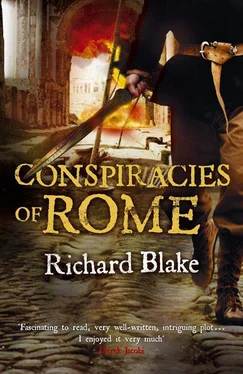Richard Blake - Conspiracies of Rome
Здесь есть возможность читать онлайн «Richard Blake - Conspiracies of Rome» весь текст электронной книги совершенно бесплатно (целиком полную версию без сокращений). В некоторых случаях можно слушать аудио, скачать через торрент в формате fb2 и присутствует краткое содержание. Жанр: Исторические приключения, на английском языке. Описание произведения, (предисловие) а так же отзывы посетителей доступны на портале библиотеки ЛибКат.
- Название:Conspiracies of Rome
- Автор:
- Жанр:
- Год:неизвестен
- ISBN:нет данных
- Рейтинг книги:3 / 5. Голосов: 1
-
Избранное:Добавить в избранное
- Отзывы:
-
Ваша оценка:
- 60
- 1
- 2
- 3
- 4
- 5
Conspiracies of Rome: краткое содержание, описание и аннотация
Предлагаем к чтению аннотацию, описание, краткое содержание или предисловие (зависит от того, что написал сам автор книги «Conspiracies of Rome»). Если вы не нашли необходимую информацию о книге — напишите в комментариях, мы постараемся отыскать её.
Conspiracies of Rome — читать онлайн бесплатно полную книгу (весь текст) целиком
Ниже представлен текст книги, разбитый по страницам. Система сохранения места последней прочитанной страницы, позволяет с удобством читать онлайн бесплатно книгу «Conspiracies of Rome», без необходимости каждый раз заново искать на чём Вы остановились. Поставьте закладку, и сможете в любой момент перейти на страницу, на которой закончили чтение.
Интервал:
Закладка:
‘He is a good Christian boy from the old province of Britain,’ Maximin hastily explained. ‘He is my secretary, and will assist in the collection of more books for the missionary libraries there.’
She sniffed and launched into a long boast about some remote ancestor of one of her late husband’s cousins – a senator, she claimed, who’d run a chain of wine shops in London. I forget the details of all this. Its burden, though, was that she distrusted barbarians and refused to have them as guests.
Though it still exists in the Empire, this distinction between barbarian and citizen has broken down in Italy. When I was first there, though, it was still sharply drawn. You can imagine I was somewhat put out by having it drawn against me. I only felt happier with Marcella when, shortly after, she took in a whole party of Franks, accepting their silver with what passed with her for a happy smile.
While I recovered my composure, she prosed on about a London she seemed to have confused with somewhere in Africa. She was cut short by one of the household slaves. There was a man at the door, asking for Maximin. A slave, he was shown into one of the common rooms on the ground floor. The urban prefect awaited us at our earliest convenience.
‘I wonder what took him so long?’ Maximin grunted.
11
In olden times, the city had been governed from the Basilica built by Constantine. In those days, the urban prefect had enjoyed dominion in the emperor’s name over Rome and its external suburbs. The prefect sat there still – though his correct title even then, I think, had changed to duke of Rome – and we hurried to be in his presence.
We repassed the Colosseum after coming down from the Caelian. It made anyone beside it look like an ant. It dwarfed even the huge buildings that surrounded it. I wanted to stop and look at it, but Maximin said we were in a hurry.
‘We can have a little tour once our business is finished,’ he said soothingly, as I looked about within this massive landscape of stone and brick. I wanted to run about, looking at everything. I wanted to see what shops there might be, and what was in them for sale. To look properly about this great city would take months, and then there would still be much to see. I wanted to make a start. Seeing some imperial official, to say who we were and get his formal consent to our remaining in the place, struck me as a dry and almost useless proceeding.
But Maximin had fussed about in his room with documents, and insisted I shouldn’t put on my fine suit. Then we’d come straight out. Now we were hurrying past things of endless interest.
The Basilica was a block further down on our left, just before the main Forum. It was interesting in itself. Being the main government building, it had suffered in the general sacks by the Goths and Vandals, but had escaped the more continuous predations of the Roman people. Therefore, it retained all its marble facing and most of the bronze tiles on its roof. The Basilica was adorned in the manner usual for ancient buildings – marble portico, colonnades, niches for statues, and so forth. But the dominant feature was its immense size. It sat on a sheet of concrete three hundred feet long and two hundred wide. Raised on each side of the width were a line of barrel vaults extending down the length. Connecting these was a great central vaulted nave, two hundred and fifty feet long, eighty wide, and a hundred and twenty high. Still smaller than the Colosseum, the building towered over us as we approached. Two giants walking abreast could have entered through the main bronze door.
The great hall inside was a shimmering mass of many-coloured marbles, lit from windows high up in the vaults. At the far end sat a colossal statue of Constantine. There were still traces of gold leaf on the upper parts. But even bare and white, it was an impressive sight. The head alone was bigger than most houses. To the right and left of the hall, staircases led to warrens of offices and smaller public rooms. On each side, about fifty feet up, were long galleries giving an overall view of the hall.
As we entered, the prefect sat before the statue of Constantine. A small man with a dark beard and a white robe fringed with purple, he was hearing a law case. Beside him on stands were icons of the emperor and empress. Slightly away from these, though at the same height, was an icon of the pope. In front of him, their clients in cowed silence, two lawyers were arguing at interminable length about some defective building works.
As we sat unobtrusively by one of the smaller statues, I gathered that the plaintiff had engaged the defendants to repair a drain. But as nobody in Rome nowadays knew anything about the correct gradient for water, there had been a flood and the plaintiff’s house had been undermined. Now the lawyers were making the most of the work put their way. Listening to their slow, turgid delivery, I was unable to work out if they were being paid by the word uttered or by the time needed to utter their words.
Otherwise, the hall was empty. It had plainly been built with crowds in mind. The prefect would once have sat among a vast concourse of litigants and petitioners, all jostling and shouting for his attention. Now he sat almost alone. There hadn’t even been beggars outside. The sunbeams moved slowly across the dusty, tiled floor, and the lawyers droned on.
I coughed. The sound echoed round the empty hall. The prefect looked up from his doze, saw us and stood.
‘This is a case of gross negligence,’ he said in the very correct Latin of someone who has learnt it as a foreign language. The exarch had recently taken to appointing Greek officials to the post, there being so few Romans willing or competent to discharge the remaining duties.
‘I give judgement for the plaintiff. I will settle the damages in my written judgement, which you will receive on the Ides of next month. You can pay the appropriate clerking fee as you leave. You are all dismissed.’
With that, he was walking quickly over to us, his legal business forgotten. One of the litigants cried out in a thick German accent that he hadn’t received justice. He had used the best engineers available, and could show the receipts. He would be taking his case to the Lateran, where justice went on the merits of the case, not the size of the bribe. The prefect ignored this.
‘Welcome to Rome,’ he said warmly, reaching out a hand to Maximin. ‘I’ve heard so much about your adventures on the road, and am eager to hear all about it at first hand.’
He took us into his private office at the far left end of the hall. A lavishly marbled room with high windows, this was piled high with books and documents mainly covered in dust. He sat at his desk, we before him. A slave appeared with a pitcher of wine. Three generous servings were made. He drained his in a single gulp and reached out his cup for another. Maximin did the same, then gave a brief and expurgated account of all we had done since that morning outside Populonium. ‘But for you and your forethought in sending out guards,’ he concluded, ‘we should certainly now be dead men. We give all thanks to you,’ he paused, ‘and, of course, to the divine prudence of the emperor, whose benevolence shines upon us all.’
He raised his cup suggestively. The slave leaned forward again.
The prefect smiled. He probably didn’t receive much flattery, and anything was welcome.
‘I was given information of something odd happening outside Populonium,’ he said, ‘and sent a force to investigate. I did give orders that any armed barbarians were to be arrested and brought back to Rome. Here, they could be tried according to the divine justice of the emperor. I was thinking of something lingering for them – something perhaps with boiling oil. Or we still have the two lions. Rex and Regina would have liked some good barbarian flesh – so much tastier than the local trash I must generally feed them.’
Читать дальшеИнтервал:
Закладка:
Похожие книги на «Conspiracies of Rome»
Представляем Вашему вниманию похожие книги на «Conspiracies of Rome» списком для выбора. Мы отобрали схожую по названию и смыслу литературу в надежде предоставить читателям больше вариантов отыскать новые, интересные, ещё непрочитанные произведения.
Обсуждение, отзывы о книге «Conspiracies of Rome» и просто собственные мнения читателей. Оставьте ваши комментарии, напишите, что Вы думаете о произведении, его смысле или главных героях. Укажите что конкретно понравилось, а что нет, и почему Вы так считаете.












